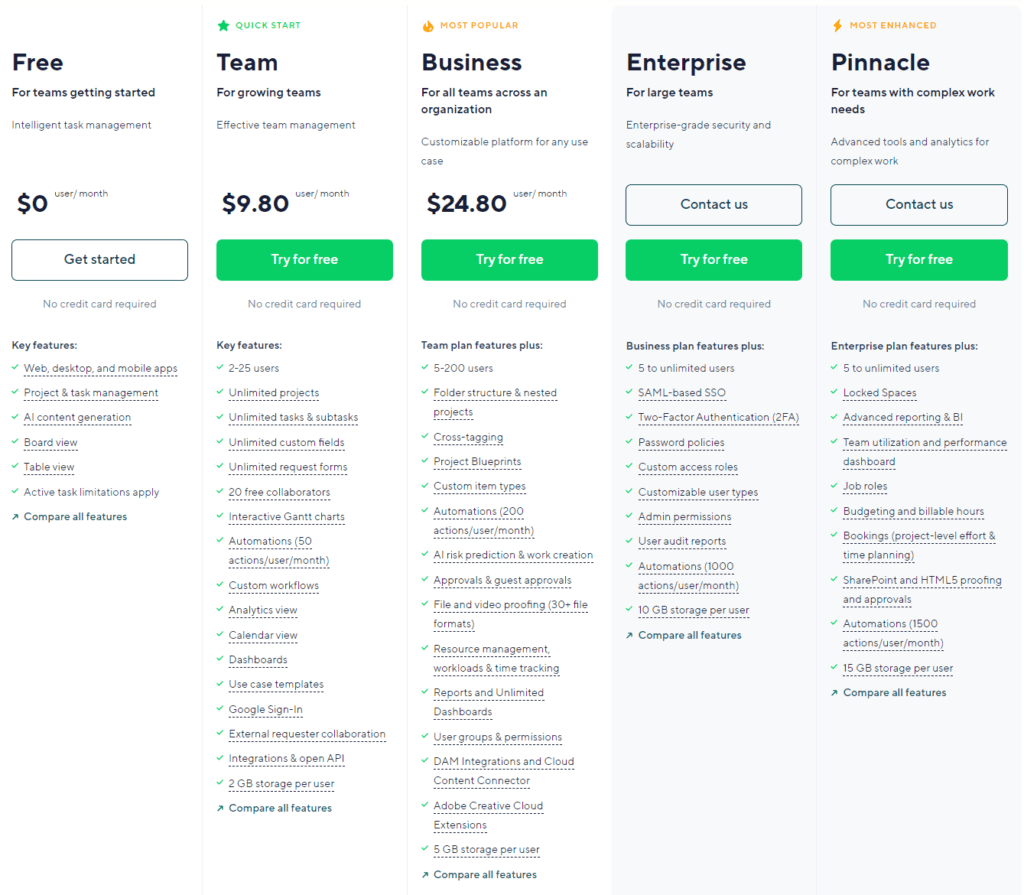Choosing the right project management tool is like setting sail on the vast ocean of productivity. With so many options on the horizon, it’s easy to feel adrift. Among the leading contenders, Wrike and Zoho Projects stand out, each promising to be the compass that guides your projects to successful shores. But which one will be the wind in your sails, and which will leave you becalmed? The journey to that answer begins with one of the most fundamental aspects: ease of use and user interface. Because, in the end, the best tool is the one that your team will actually use — not just on sunny days but also during stormy seas.
| Wrike | Zoho Projects |
|---|---|
| G2 Score – 4.2 out of 5 stars | G2 Score – 4.3 out of 5 stars |
| TrustRadius Score – 8.2/10 | TrustRadius Score – 8.5/10 |
Ease of Use and User Interface: Charting the Course
Wrike: A Streamlined Voyage
Wrike greets its users with a clean, intuitive interface that aims to minimize the choppy waters of project management. Designed for teams seeking a sophisticated yet accessible tool, Wrike offers a streamlined experience that simplifies navigation without sacrificing depth. The platform’s dashboard provides a clear overview of your projects, tasks, and deadlines, ensuring that you can see at a glance where you need to focus your efforts.
Customization is a strong current within Wrike, allowing teams to tailor the interface to their specific needs. Whether it’s adjusting the dashboard to highlight key projects or using custom workflows to mirror your process, Wrike offers the flexibility to create a personalized navigation experience. However, with such sophistication comes a steeper learning curve, especially for teams new to project management tools.
Zoho Projects: Charting a Friendly Course
In contrast, Zoho Projects opts for a more straightforward approach, making it a friendly port for teams of all sizes. Its user interface, while packed with features, emphasizes simplicity and ease of use. The platform’s layout is intuitive, with clear pathways to tasks, milestones, and documents, ensuring that new users can find their bearings quickly.
Zoho Projects shines in its ability to make project management approachable. The platform offers guided setups, templates, and an easy-to-navigate interface that encourages teams to dive right in. While it may lack some of the high-level customization options of Wrike, Zoho Projects balances this with user-friendly design and straightforward functionality, making it an attractive option for teams looking for a tool that blends simplicity with capability.
Integration Capabilities: The Ties That Bind Your Digital Ecosystem
The ability of a project management tool to integrate with other software not only streamlines workflows but also minimizes the need to switch between apps, thereby saving time and reducing the risk of information silos. Here’s an overview of the integration capabilities of Wrike and Zoho Projects.
Wrike: A Conduit for Seamless Integration
Wrike understands the importance of being a central hub within your digital ecosystem. It offers a robust array of integrations with popular business tools and services across various categories including communication platforms like Slack and Microsoft Teams, file storage solutions such as Google Drive and Dropbox, and CRM systems including Salesforce. These integrations are designed to facilitate a seamless flow of information across platforms, ensuring that all project-related data is accessible within Wrike.
Moreover, Wrike’s open API allows for custom integrations, enabling businesses to tailor the platform’s connectivity to their specific needs. This level of flexibility is particularly beneficial for larger organizations or those with unique workflows that standard integrations might not fully support.
Zoho Projects: Integrated Within the Zoho Ecosystem and Beyond
Zoho Projects leverages the strength of the Zoho ecosystem, offering native integrations with other Zoho apps like Zoho CRM, Zoho Sprints, and Zoho Docs. This internal connectivity ensures that teams using multiple Zoho products can enjoy a cohesive and integrated experience, with data flowing smoothly between project management, sales, and document collaboration tools.
Beyond its ecosystem, Zoho Projects provides integration options with external tools such as Google Drive, Microsoft Office 365, and Slack, covering the essentials for document storage, collaboration, and communication. While perhaps not as extensive as Wrike’s offerings, Zoho Projects’ integration capabilities are designed to meet the needs of most small to medium-sized teams.

Related: Check out our free SEO suite

Fostering Team Unity: Collaboration and Communication in Wrike and Zoho Projects
Wrike: Enhancing Team Dynamics with Integrated Communication
Wrike understands that the heart of project management is people working together towards a common goal. To support this, Wrike integrates several features aimed at fostering collaboration and ensuring clear communication within its platform. Real-time commenting on tasks and documents, @mentions, and live document editing allow team members to exchange ideas, provide feedback, and make decisions quickly without leaving the app. This immediate exchange of information helps in keeping the team aligned and moving forward together.
Moreover, Wrike offers shared calendars, interactive Gantt charts, and customizable dashboards, which not only provide visibility into project timelines and individual responsibilities but also serve as central points for team discussions and planning. The platform’s emphasis on visibility and access to information ensures that every team member, regardless of their role or location, can stay informed and contribute effectively to the project.
Zoho Projects: Streamlining Communication with Structured Collaboration Tools
Zoho Projects approaches collaboration with a structured suite of tools designed to streamline project communication and teamwork. The platform offers forums, chat rooms, and comment sections directly within tasks and milestones, enabling team members to discuss ideas, resolve issues, and share updates in a contextually relevant manner. This emphasis on structured communication channels ensures that discussions are organized and easily accessible, enhancing clarity and reducing the potential for misunderstandings.
In addition to these communication tools, Zoho Projects provides features like shared document storage, integrated time tracking, and task automation, which further support collaborative efforts by simplifying the logistics of working together. The ability to set up project wikis within Zoho Projects also stands out as a valuable feature for teams, offering a centralized repository for project knowledge, guidelines, and resources, which is particularly beneficial for onboarding new team members and maintaining continuity in long-term projects.
Streamlining Success: Task Management and Workflow Automation
The way a project management tool handles task assignment, tracking, and automation can be a game-changer for teams, influencing both the smooth execution of projects and the overall team morale.
Wrike: Mastering Complex Projects with Advanced Task Management
Wrike shines when it comes to handling complex projects and workflows. Its task management system is both robust and flexible, allowing for detailed task creation that can include descriptions, attachments, due dates, and custom fields for capturing specific information. Subtasks and dependencies can be easily managed, enabling teams to break down large projects into manageable units and ensure that work flows logically from one stage to the next.
Where Wrike particularly excels is in its workflow automation capabilities. The platform allows teams to create custom workflows that can automate repetitive tasks, such as assigning tasks based on specific triggers or updating task statuses when certain conditions are met. This level of automation ensures that workflows are both efficient and consistent, reducing the potential for human error and ensuring that projects progress smoothly.
Zoho Projects: Simplifying Task Management with Intuitive Automation
Zoho Projects offers a straightforward and intuitive approach to task management, designed to cater to teams of all sizes. Its task management system allows for easy creation and tracking of tasks, with features such as milestones, task lists, and dependencies helping teams to organize and prioritize work effectively. Zoho Projects also supports time tracking directly on tasks, making it simpler for teams to monitor effort and productivity.
In terms of workflow automation, Zoho Projects provides a range of pre-built automation rules that teams can customize to suit their needs. These rules can automate common project actions, such as sending notifications when tasks are completed or escalating tasks when deadlines are missed. While Zoho Projects’ automation features might not offer the same level of customization as Wrike, they are user-friendly and sufficient for streamlining many common project workflows.
Illuminating the Path: Reporting and Analytics
Wrike: Comprehensive Insights for Informed Decision Making
Wrike offers a robust suite of reporting features designed to provide teams and stakeholders with comprehensive insights into project performance. The platform allows for the creation of customizable reports that can track everything from basic task completion to more complex metrics like project timelines, workload distribution, and budget adherence. These reports can be tailored to meet the specific needs of different stakeholders, ensuring that everyone has the relevant data they need to make informed decisions.
Beyond custom reports, Wrike’s analytics dashboard presents visual data summaries that highlight key performance indicators (KPIs), offering a quick overview of project health and progress. This feature is particularly useful for project managers and team leads who need to keep a pulse on multiple projects simultaneously. Wrike’s ability to integrate data from other tools further enriches its reporting capabilities, offering a holistic view of project and team performance.
Zoho Projects: Streamlined Reporting for Efficiency and Clarity
Zoho Projects provides a streamlined approach to reporting, offering a variety of pre-built and custom report templates that cater to common project management needs. The platform’s reporting feature covers task progress, milestone achievements, time tracking, and budget status, among other metrics. These reports are easily accessible and can be configured to provide regular updates to team members and stakeholders, ensuring transparency and accountability throughout the project lifecycle.
One of the strengths of Zoho Projects in the realm of reporting is its user-friendly interface, which simplifies the process of generating and interpreting reports. The platform also offers dashboards that provide visual summaries of project data, allowing for quick assessments of project status and team productivity. Additionally, Zoho Projects’ integration with Zoho Analytics amplifies its reporting capabilities, enabling deep data analysis and the creation of custom dashboards for more nuanced insights.
Pricing
Wrike Price:

Zoho Projects Price:

Conclusion
Wrapping up our comprehensive exploration of Wrike and Zoho Projects, we’ve navigated through the critical aspects that influence the selection of a project management tool. From the user interface and ease of use, integration capabilities, customization and flexibility, to reporting and analytics, and finally, user support and community engagement, both platforms showcase distinct strengths and offerings tailored to diverse project management needs.
Wrike emerges as a robust solution for organizations seeking a highly customizable and sophisticated tool capable of accommodating complex projects with its advanced task management, workflow automation, and comprehensive reporting features. Its extensive support system and educational resources, combined with an active community forum, make it a powerful ally for teams that require depth and flexibility in their project management software. Wrike is particularly suited for large teams and enterprises that demand precision and scalability, offering the tools and support needed to tackle challenging projects and streamline operations.
Zoho Projects, part of the broader Zoho ecosystem, provides a user-friendly and structured platform that excels in streamlined task management and intuitive workflow automation. With solid integration capabilities and efficient reporting tools, it caters to small and medium-sized teams looking for a straightforward yet effective project management solution. Zoho Projects stands out for its responsive support and vibrant community, benefiting from the ecosystem’s wide range of business tools and fostering a space for users to connect, learn, and grow.
Read Next:
- Aritic Mail vs Stripo: The Best Email Marketing Tool for You
- Buffer vs Falcon.io: The Best Social Media Management Tool for You
- Sprout Social vs Loomly: The Best Social Media Management Tool for You
- Buffer vs Khoros: The Best Social Media Management Tool for You
- MoonMail vs Drip: The Best Email Marketing Tool for You






















Comments are closed.